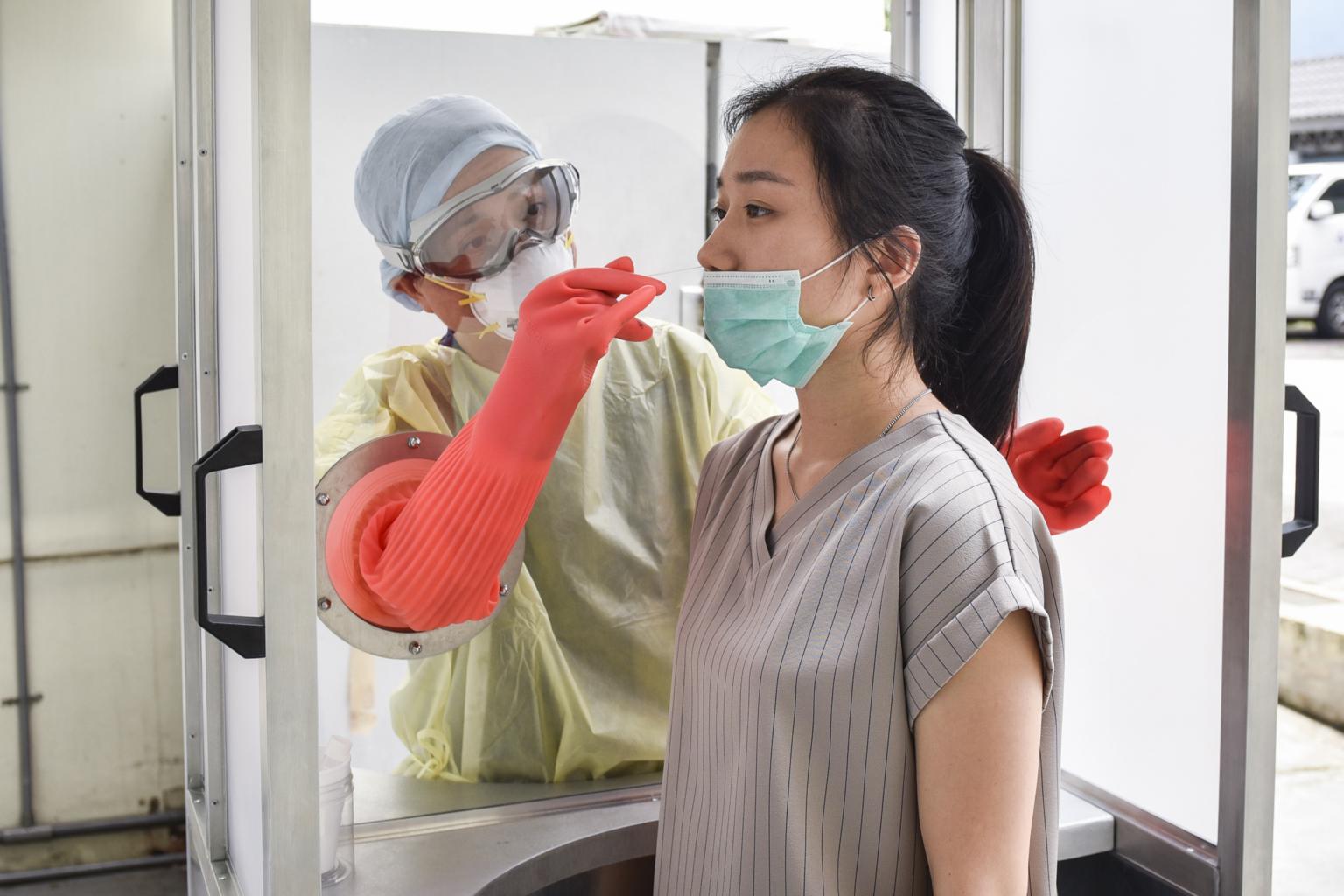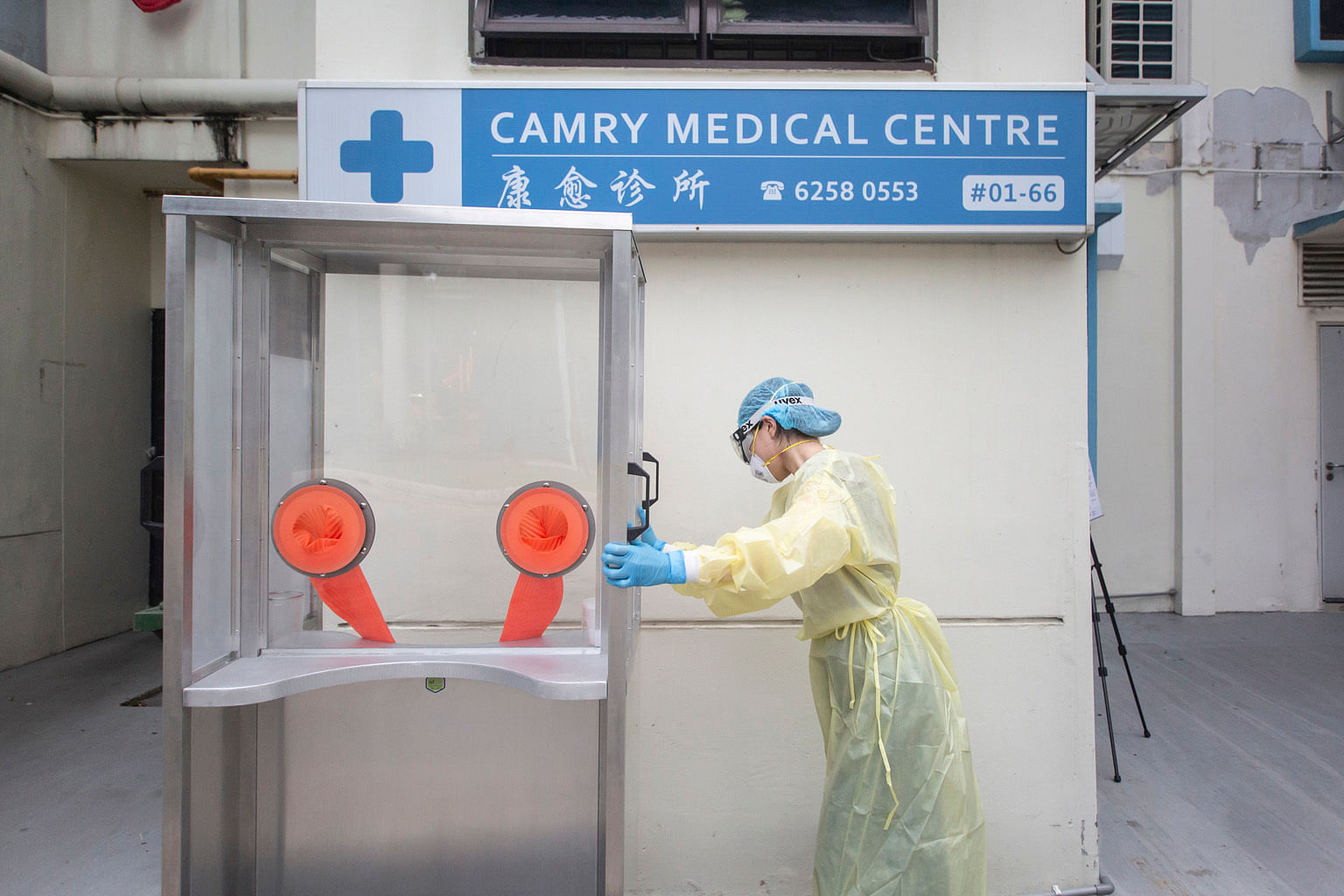170 Covid-19 swab booths trialled at clinics, boosting testing capacity in Singapore
Sign up now: Get ST's newsletters delivered to your inbox

These clinics will be able to provide Covid-19 testing to patients with acute respiratory infection symptoms.
PHOTO: CAROLINE CHIA
Follow topic:
SINGAPORE - Swab booths are now located at 170 clinics islandwide to allow those with shortness of breath and cough or showing any sign of a Covid-19 infection to get tested while bolstering the safety of the general practitioners (GPs), clinic staff and their patients.
It is in line with the national effort to ramp up testing capacities with Singapore having moved into phase two of its reopening.
The clinics are part of a 900-wide network of Public Health Preparedness Clinics (PHPCs) spread across the island, out of which 400 are equipped to allow anyone aged 13 and above diagnosed with acute respiratory infection (ARI) symptoms to get tested for the coronavirus.
The Ministry of Health (MOH) had previously said the strategy is to test everyone diagnosed with ARI once there is sufficient testing capacity.
The swab booths, built using an aluminium frame and polycarbonate panels, are lightweight and mobile. They were developed by local engineering company ATC, and sponsored by Temasek Foundation.
Known as Cosmo-Slim, they have been on trial since end-July to equip PHPCs with safe and effective mobile swabbing capabilities, said chief executive of Temasek Foundation Ng Boon Heong.
He added that the booths allow the 170 clinics to be "better protected while swabbing patients displaying symptoms of acute respiratory infections immediately at their clinic's practice, without having to send them to another location".
Swab tests are also available at Regional Screening Centres, a network the Health Promotion Board is expanding. With testing capacities enhanced, the load on other facilities such as hospitals will be lowered, note doctors.
Dr Teo Boon See, who was among the GPs who helped in the design of the swab booth, said having one at her Camry Medical Centre clinic in Toa Payoh Lorong 4 will make swabbing more convenient for her patients while ensuring the safety of the staff involved.
"Sometimes, patients sneeze and cough as they are swabbed. So having a swab booth protects the doctor from coming into contact with their respiratory droplets," said Dr Teo, who sees many elderly patients.
"When patients are swabbed at their neighbourhood GPs, they can return home to await their tests results instead of having to travel to other testing centres, to get their swabs done, which brings them more convenience and also helps to keep the community safe.
"There's also an added sense of comfort and familiarity for patients who may be squirmish about getting swabbed, if it's their regular GP who is the one administering the test," she added.
GPs can direct patients who require a swab test to selected PHPCs in the Swab and Send Home (Sash) programme as well as polyclinics.
For patients to receive a free consultation and swab test, they must arrive at their referred Sash PHPC within 48 hours. Otherwise, rates clinics normally charged under the Flu Subsidy Scheme or Community Health Assist Scheme (Chas) will apply.
It will cost Singaporean and permanent residents, and eligible work permit holders, a flat subsidised rate of $10. Pioneer Generation and Merdeka Generation seniors would need to pay $5.
The swab tests at PHPCs typically take around one to two days to process and patients are advised to stay home awhile awaiting their results.
Meanwhile, GPs participating in the swab booth trial have been encouraged to provide feedback after using the booths, to help improve the design and functionality.

The swab booths, built using an aluminium frame and polycarbonate panels, are lightweight and mobile.
PHOTO: TEMASEK FOUNDATION
Based on previous feedback, the booth's design was made slimmer and more compact so that it could easily be pushed through clinic doorways.
Doctors are required to put on personal protective equipment when conducting the swab tests, and they are encouraged to use the booth outdoors, in quiet areas with low human traffic, or in a well-ventilated room inside the clinic.
Panels on the booth are made of a frosted material so as to ensure patient privacy.
Latex gloves are affixed to a panel separating the swabber from the patient, where doctors insert their hands to collect the swab sample from the patient.
Once the swab has been taken, all areas of the booth must be sprayed immediately with a 70 per cent alcohol disinfectant, so as to prevent cross-contamination between patients.
As an added layer of safety, the booth has also been fitted with a self-disinfecting antimicrobial coating which lasts for around six months, though tests for the coating's efficacy are still in the process.

